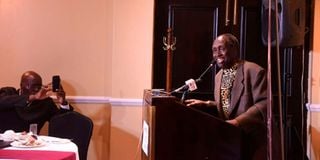Of Ngugi winning the PEN award and comparisons with the Russian giant

Prof Ngugi wa Thiong’o during a Kenya Editor’s Guild meeting at the Sarova Stanley in Nairobi on February 6, 2019, where he unveiled the book Kenda Muiyuru. Prof Ngugi was named a recipient of the PEN/Nabokov Award for Achievement in International Literature.
“No single word in English renders all the shades of toska. At its deepest and most painful, it is a sensation of great spiritual anguish, often without any specific cause. At less morbid levels it is a dull ache of the soul, a longing with nothing to long for, a sick pining, a vague restlessness, mental throes, yearning. In particular cases it may be the desire for somebody of something specific, nostalgia, love-sickness. At the lowest level it grades into ennui, boredom,” so wrote Vladimir Nabokov on the Russian word toska; roughly translated as sadness.
I was reminded of Nabokov and his unique style of writing on February 2, 2022, when Ngũgĩ wa Thiong'o was named a recipient of the PEN/Nabokov Award for Achievement in International Literature. The award is given to writers “whose works evoke to some measure Nabokov's brilliant versatility and commitment to literature as a search for the deepest truth and the highest pleasure — what Nabokov called the 'indescribable tingle of the spine’.” As I absorbed the news, I thought of Nabokov and other Russian literary greats from Pushkin, Gogol, Turgenev, Dostoevsky to Tolstoy and in what ways our own Ngũgĩ evoked them through his life and works.
Tolstoy is the master of grand narrative description. He could summon beautiful images of a charmed Russia — endless Russian steppes, calm housewives and elegant St Petersburg homes in masterly craftsmanship and refined prose. Reading Tolstoy, it has been said, is like holding onto a railing up a lush Russian valley; inhaling the scent of green grass in the undulating terrain.
Scarred landscape
Reading Dostoevsky, on the other hand, is like surveying a scarred landscape razed down by hellfire — he wrote despairing, edgy, dark and sprawling prose — grimacing, gloomy and gruesome.
While not exactly a Tolstoy or a Dostoevsky, Nabokov was also very visual and graphic in his works. And he could wax philosophical: “Human life is but a series of footnotes to a vast obscure unfinished masterpiece”. He could also be playful: “Do not be angry with the rain; it simply does not know how to fall upwards.”
Winning the PEN/Nabokov award was apt for Ngũgĩ because there are certain similarities between him and Nabokov especially if one overlooks Nabokov’s many controversies, chief of which was writing Lolita, considered inappropriate by many people because the main character, a middle-aged named Humbert Humbert, is obsessed with a 12-year-old girl, Dolores Haze, whom he abuses after he becomes her stepfather.
However, Nabokov had many similarities with Ngũgĩ. The first is that both writers are great wordsmiths who write beautiful, descriptive sentences that artfully paint characters to become alive in readers’ minds. Like when Ngũgĩ writes in The River Between that, “Waiyaki was now a tall, powerfully built man who struck people as being handsome. Even so this was not the most striking thing about him. It was his eyes. They looked delicately tragic. But they also appeared commanding and imploring. It was his eyes that spoke of that yearning, that longing for something that would fill him all in all”. We can picture Waiyaki; and almost see into his eyes and heart.
Both writers were exiles in the United States of America at some point in their lives. Nabokov spent years “in exile after escaping Russia when the Bolsheviks destroyed his idyllic childhood,” as described elsewhere. Ngũgĩ, on the other hand, had a brush with Kenyan authorities after writing Ngaahika Ndeenda (I Will Marry When I Want), after which he was detained. After his release, he chose to live in exile in London. He later went to the United States.
American universities
They both taught in American universities while in exile there. Nabokov first taught at Wellesley College and later at Cornell where he became quite famous as the author of Lolita and Pnin and known on campus as “a lecturer not to be missed”. On his part, Ngũgĩ has previously taught at Northwestern University, Yale University, and New York University and currently is Distinguished Professor of English and Comparative Literature at the University of California, Irvine.
One other way the two writers compare, less known for Nabokov but obvious for Ngũgĩ is that both are champions for justice. Nabokov was familiar with loss, injustice, exile and the consequences of political violence. Carmela Ciuraru writes that Nabokov was “Born in 1899 to prominent parents in St. Petersburg, but his gilded life eventually shattered: his family was forced to flee revolutionary Russia, losing both their homeland and their fortune. His fiercely political father had been imprisoned for his activism and was assassinated in Berlin when Nabokov was just 23 years old. His younger brother, Sergei, died in a concentration camp”. Though controversial, Lolita questions injustice in our society through the 12-year old tragic heroine.
Ngũgĩ is known for championing justice, lampooning corruption and dark deeds in Kenya and in the continent with tales that tease and then bite in cutting sarcasm; tackling the absurdities, injustices and sleaze of our continent.
It’s really encouraging that Ngũgĩ has been named a recipient of the PEN/Nabokov Award; Nabokov would have been glad.





